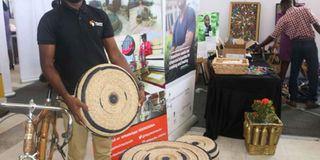Innovators take climate change matter head-on

Jeffrey Kwabena Yeboah with coffee tables made from tyres at the Africa Climate Week in Ghana in March 2019. PHOTO | LEOPOLD OBI
For ages, mankind has relied on technological innovations to advance, but industrialisation and human activities, have increasingly released tonnes of carbon dioxide into the atmosphere – through the use of fossil fuels, burning of plastics and deforestation —causing average temperatures to rise by at least 1°C globally. Though a small margin, the rise in temperature has been linked to extreme weather events like prolonged drought and heavy floods.
While Africa accounts for minimal emissions, it is adversely affected by climate change. And at the recent Africa Climate Week conference in Accra, Ghana, innovators showcased how creativity can be key in tackling climate change. The technologies – designed from recycled wastes, and giant grasses– were the centre of attention at the event where African researchers and policymakers convened.

Bernice Dapaah, a bamboo bicycle innovator at the Africa Climate Week in Ghana in March 2019. PHOTO | LEOPOLD OBI
Bamboo bicycles
Bernice Dapaah, the chief executive of the Ghana Bamboo Bikes Initiative (GBBI), began the company in 2008 and manufactures bicycles whose frame is made of bamboo, with only a few parts such as the handle and the wheels made of metal. The company exports over 1,000 units of the ‘green bicycles’ to Europe and North America.
In Dapaah’s hometown of Kumasi, southern Ghana, bamboo plantations exist in acres. And the emergence of the bamboo bicycle manufacturing in Ghana, is a big boost to farmers who own bamboo plantations. By riding the bikes or promoting their production reduces carbon emission in various ways, the innovator, who has been riding a bamboo bicycle for five years, says.
Bamboo improves air and water quality in areas where it is planted. The increased cultivation and use of bamboo as an alternative to wood also helps preserve and rehabilitate Ghana’s dwindling forests. Additionally, its root system reduces soil erosion, which is a concern for many farmers. Compared to the production of traditional metal bicycles, bamboo bikes require much less energy than production of steel bikes: producing a steel bicycle frame emits about five kilos of carbon dioxide.

Makafui Awuku with artwork made from recycled plastic waste at the Africa Climate Week in Ghana in March 2019. PHOTO | LEOPOLD OBI
Tyre furniture
For the last four years, Jeffrey Kwabena Yeboah has been turning discarded vehicle tyres into beautiful household furniture.
The University of Ghana graduate was drawn to it after he seeing mechanics in Accra burning old tyres, but even then, he was surprised when locals embraced his furniture. He gets the tyres from boys who collect discarded tyres, and gives them a token of appreciation. Once a piece of furniture (coffee table or armchair) has been designed, ropes are woven around it to make it colourful, and a glass can also be installed on top of the tables to make it classier.

Eric Reynolds, a clean stoves entrepreneur displays the Inyenyeri clean cooking system at the Africa Climate Week in Ghana in March 2019. PHOTO | LEOPOLD OBI
Inyenyeri’s clean-cooking stove
Many households in rural and urban centres rely on firewood or charcoal for cooking. However, in Kenya, where the government has placed a moratorium in logging and charcoal burning, the cost of charcoal can be prohibitive. Moreover, indoor air pollution from these unclean fuels affects health.
Eric Reynolds, a clean stove entrepreneur in Rwanda, is pioneering an innovation that he has christened Inyenyeri. Reynold offers stoves to customers who buy fuel pellets.
“By using the pellets, forests are spared, because making wood pellets requires far fewer trees than wood fires and charcoal, and users are protected from ailments associated with exposure to smoke while cooking,” he says.



